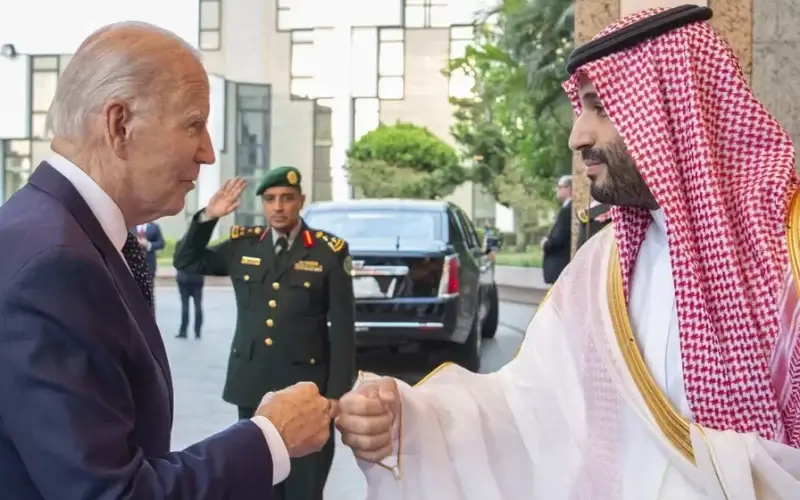President Biden completed his first presidential visit to the Middle East last week. During his visit to Israel, he reaffirmed his commitment to the U.S.’ greatest regional partner, discussed his intentions and goals in dealing with Iran, and promoted the two-state solution to the Israel-Palestinian issue. He then met with Palestinian Authority President Mahmoud Abbas and voiced his support for the Palestinian people and emphasized that the Palestinian people deserve the “same freedom and self-determination of their neighbors.” After, President Biden flew to Jeddah to meet with the Crown Prince and de facto leader of Saudi Arabia, Mohammed Bin Salman. This meeting was undoubtedly the most controversial and drew criticism from foreign policy leaders and human rights advocates alike. At a summit in Jeddah, Biden emphasized that “the United States is going to remain an active, engaged partner in the Middle East” and that the “U.S. will not walk away.” These words were likely well received as Middle East leaders recall Biden’s embarrassing withdrawal from Afghanistan.
1. Israel’s “Best Friend”
The meeting between Israeli Prime Minister Yair Lapid and President Biden was deemed a success as the two leaders reaffirmed their partnership and defined terms for further partnership. Prime Minister Lapid described Biden as a “great Zionist” and “one of the best friends Israel has ever known.” Biden reflected on his first visit to Israel as a freshman senator in 1973 and said “you don’t need to be a Jew to be a Zionist.” The Joint Declaration on the U.S.-Israel Strategic Partnership was adopted to reassure Israel amidst increasing threats from Iran and its proxies. The U.S. emphasized its “commitment to preserve and strengthen Israel’s capabilities to deter its enemies” and promised to never allow Iran to acquire nuclear capabilities.
President Biden expressed frustration with Iran’s regime over the stalled nuclear deal discussions and sent a clear message: “we won’t wait forever.” In a discussion with PM Lapid, Biden said he would use “military force” as a last resort, but that “diplomacy is still the best way”. This seemed to be the only major disagreement between the leaders, as Israel asserted that “diplomacy will not stop them” and that “the only way to stop a nuclear Iran is if Iran knows the free world will use force.” President Biden also declared that removing Iran’s IRGC from the U.S. list of Foreign Terror Organizations was off the table. These affirmations and reassurances came as a relief to Israel, who has vehemently opposed the Iran deal since its original signing in 2015.
2. Palestinians
President Biden met with Palestinian Authority President Mahmoud Abbas the following day and stressed his belief in self-determination and state sovereignty for the Palestinian people. Otherwise, however, there was little productive discussion and little focus on initiatives to solve the Israel-Palestine conflict itself. President Biden did outline a number of initiatives that would support the Palestinian people without going so far as to anger Israel. These included improving access to health care and education, reducing food insecurity, providing services and resources for refugees, and acting as a moderator in peace talks when needed. Biden visited Augusta Victoria Hospital in East Jerusalem to announce a multi-year donation of $100 million to the East Jerusalem Hospital Network. However, many Palestinians were displeased with this and frustrated that no plan was outlined to address the actual conflict, instead, Biden only reinforced support for a two-state solution. Palestinian Fatah senior official Jibril Rajoub said that “we only hear empty words and no results.”
3. The ‘controversial’ meeting with MBS
Since President Biden made a campaign pledge to make Saudi Arabia a “pariah” state, he now feels he has to make amends with the Kingdom. Many human rights advocacy groups have harshly criticized Biden’s visit, claiming it undermines U.S. values and emboldens MBS’ actions. Saudi ministers said that the murder of Jamal Khashoggi went unmentioned during the meeting, but President Biden denied this and claimed that human rights are a top priority for his foreign policy and was heavily emphasized during his meeting with MBS.
Despite criticism from many for failing to hold MBS accountable and failing to stand by his campaign promises, others have defended the visit. President of the Council on Foreign Relations Richard Hass wrote that “critics of the trip to KSA get two things wrong. First, you have to deal with the leaders that exist, not ones you prefer. Second, what matters is not ‘deliverables’ but building a relationship with Saudi leaders that will allow the two countries to collaborate on Iran, Israel, oil, etc.”
4. Oil production
Explicit goals of President Biden’s visit to the Middle East included countering Iran, China, and Russia and establishing strong leadership and strategic partnerships in the region. While not explicitly mentioned, oil production and prices were undoubtedly on everyone’s mind, especially approaching the November Midterms. Saudi Arabia is the undeclared leader of OPEC and often determines OPEC policies and oil production. Saudi Arabia reinforced that it cannot increase production any further, much to the dismay of President Biden and the American people. OPEC and OPEC+ countries will meet in the beginning of August to discuss production levels, but the meeting is unlikely to yield any better results. During the visit, the consistent message was that one country alone cannot determine oil output and supply. Nonetheless, increasing supply without properly consulting other OPEC countries would undoubtedly cause frustration. Frankly, it seems as though OPEC has little regard for President Biden’s goals as increased oil prices greatly benefit the oil exporting countries.
5. Steps toward normalization
The Biden administration has decidedly continued former President Trump’s efforts to increase ties and normalize relationships between Israel and the Arab states via the Abraham Accords. Saudi Arabia has been reluctant to partake, demanding a solution to the Israel-Palestine conflict before formally becoming signatory to a deal with Israel. However, many of the Kingdom’s allies and partners have already normalized relations and likely with clandestine approval from the Saudis. However, Saudi Arabia is coming to the realization that a partnership with Israel could be extremely beneficial in countering Iran, squashing the spread of terror cells, and expanding their economy beyond oil. Steps towards normalization are taking place, although only incrementally. For example, the U.S. is assisting in the transfer of Red Sea Islands from Egyptian sovereignty to Saudi sovereignty with Israeli approval. Most recently, the first direct flight between Israel and Saudi Arabia was established as a result of Biden’s visit. This will also help promote tourism and religious tourism within Saudi Arabia. This blossoming partnership would be instrumental in establishing a safer, more prosperous, and independent Middle East by deterring Iran’s regime, collaborating in counterterrorism efforts, integrating economic systems, and preventing malicious foreign intervention from China and Russia.










